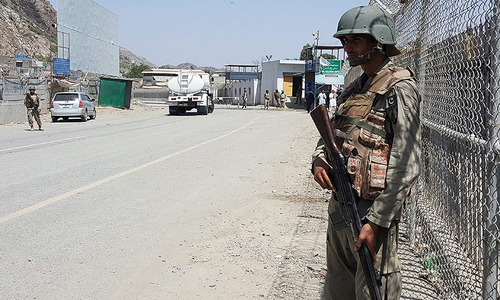QUETTA: A loving father, husband, son, brother and a brave soldier: this is how his family, friends and community remember Maj Ali Jawad Changezi, who died at Peshawar’s Combined Military Hospital on June 14.
The armoured corps officer was brought to the hospital with fatal wounds suffered during an exchange of heavy gunfire at Torkham between the security forces of Pakistan and Afghanistan — which his Hazara ancestors had fled over a century ago to escape religious persecution by its ruler, Abdur Rahman, to make Quetta their new home.
“The first time we strongly felt the absence of our [late] father was the moment we lowered Jawad’s body into the grave; we have lost our father in him,” Maj Ali Asad, his younger brother, told Dawn at their family home in the small, quiet Hazara neighbourhood of Musa Town, Marriabad, in Quetta.
Clashes erupted on June 12 after Afghan security forces “resorted to unprovoked firing” on Pakistan’s side of Torkham, over disagreement of Islamabad’s plans to construct a gate on its side of the crossing to regulate cross-border traffic.
At least four soldiers were reported killed on both sides of the Durand Line, which serves as the international border between the two nations. Kabul does not recognise the Durand Line and has opposed Pakistan’s attempts at fencing the border and regulating movement across it.
Pakistan stated that construction on its side of the Torkham crossing, the most important and frequently used trade link with war-ravaged Afghanistan, was to stop movement of militants and to counter illegal trafficking.
The escalation in tensions resulted in the temporary suspension of all traffic from Torkham, which resumed on June 18, reportedly after active American mediation. The crossing had last closed for a few days in May for similar reasons.
Born in 1968 in the small garrison town of Kharian, a central Punjab district — where his father Brig Khadim Hussain, also a decorated soldier, was posted at that time — Maj Jawad was eldest of three brothers and a sister, and spent most of his early years in Quetta before joining the Pakistan Military Academy in 1988 and getting commission two years later.
Soft-spoken and social, Maj Jawad was fond of reading, hunting and hiking. “He was a fair man who never did any wrong to anyone. He is loved by all. He had deep links in the Hazara community and would try to return to Quetta every now and then to spend time with his family, friends and community,” said Maj Asad, his eyes wet with tears.
A father of two girls and two boys, he said, Maj Jawad was an excellent father, son and brother. He dropped a promotion course because he wanted to take care of his ailing father, who had worked untiringly for many years in Balochistan as the first Commissioner for Afghan Refugees in the 1990s before his death.
“When our brother was offered an extension [on completing 23 years of service in October 2014], he had accepted it only because he wanted to serve the country in an operational area [war zone] before retiring,” said Maj Asad, recalling conversations with his slain brother.
“When we tried to dissuade him from getting a field posting in the operational area, he told us: look, our father fought two wars [1965 and 1971] and both of you spent three years in operational areas [Fata]. I don’t want to retire without serving in a war zone.”
“Soldiering is in our family’s blood, it’s our family’s legacy,” Maj Ali Qasim, the youngest of the three brothers, chipped in. His young children narrowly escaped a Taliban rocket attack on their car when he was posted in the operational area of Landi Kotal some time ago.
Their grandfather had joined the British colonial military after the family made Quetta — then a garrison town — their home. “The members of the Hazara tribe are urban people; they do not own land and, thus, most of us are either in government jobs or have small businesses. A big number of our men have served in the army for the last three generations,” said Col Abid Nazar, one of their uncles.
In spite of their services for Pakistan, Quetta’s Hazara community — more than half a million souls — has developed a ‘siege mentality’ due to frequent attacks by sectarian groups, such as Lashkar-i-Jhangvi, over the past 15 years. A Hazara activist, preferring anonymity, told Dawn that over 2,500 men, women and children have died in such attacks.
“We happen to be an easier target of the militant Sunni groups because of our distinct features and fair skin,” he said. “Except for a couple of small attacks where Hazaras were targeted, violence against our tribe has de-escalated in recent months. But you never know when they decide to resume targeting us. We still feel cut off and besieged. When we go to bazaars, people look at us with surprise — as if we do not belong here.”
Years of sectarian violence has forced many Hazaras to close their businesses, sell or rent their property and leave the country. Maj Jawad’s uncle, Sajjad Nazar, now retired from the Sui Southern Gas Pipeline Limited, could not go to his office for years due to threats from militant groups. “Almost all of us have directly or indirectly been affected by violence,” he said, adding that his elder brother left the country for similar reasons.
Maj Qasim, now posted at the Corps Headquarters in Quetta, said: “We have to face many threats because of being Hazara. But we have a strong belief in Pakistan; our elders struggled for this country, laid down their lives protecting it and won medals for bravery; it is our home and we will never give up on it.”
Published in Dawn, July 1st, 2016















































